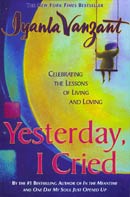Yesterday I Cried: Celebrating the Lessons of Living and Loving
By Iyanla Vanzant
Reviewer:
Katharina Manassis

The front cover of the book is inscribed ‘there’s always
someone worse off’, and that about sums up the author’s life. Found in the
‘Life Challenges’ section of our library, this book straddles the fence between
autobiography and self-help. When I read two paragraphs to my daughter, her
reaction was “Oh mom, it’s so depressing! How can you read that?” My
response was “Same reasons I went into psychiatry: curiosity about how people
become the people they are, and the thankful feeling I get when I realize the
inscription is true: there’s always someone worse off”.
In truth, this wasn’t the worst horror story I’ve heard of
childhood abuse and its lifelong consequences. What was impressive,
though, was the extent of Iyanla’s recovery. Many people who suffer
extensive physical, sexual or emotional abuse as children become chronically
unstable adults: unstable moods (sometimes with recurrent rages or suicide
attempts), unstable jobs, unstable relationships, unstable sense of self,
unstable period. They’re not out of touch with reality, and may even (as in
Iyanla’s case) be quite intelligent, just unstable. The nasty label
psychiatrists may apply to them is ‘borderline personality disorder’, and Iyanla
certainly would have fit that label in her early adult years. Most of them
suffer terribly, but learn to act on their feelings less as they get older, and
so appear more stable with age even though their enjoyment of life is limited.
Iyanla, by contrast, moves far beyond mere stability.
Inspired by both African and Christian spiritual influences, she is able to
identify and dismantle her self-destructive habits one by one. She slips back
into them, of course, as we all do. Whether we’re aware of it or not, we yearn
for the familiar experiences of the past, even when they’re painful. Undeterred,
Iyanla continues to work on changing her life so it becomes more consistent with
her beliefs, even when the process involves some risk. She shares that story in
detail, hoping that others will learn from her journey.
What kept me reading through all these graphic descriptions
of cruelty and disappointment? The self-analytical writing style is not
the most gripping. Telling the story in repeated flashbacks is also a
rather tedious literary device. The great, present-day question she
wrestles with in her jacuzzi (“How am I ever going to fire my literary agent?”)
seems almost comical in light of the beatings, rape, extreme deprivation, and
total rejection she has had to overcome prior to that point.
What kept me reading was curiosity about one thing: How
Iyanla (the new self) reconciles with Rhonda (the old self). It’s unusual
to read an autobiography that is written, as this one is, in the third person.
Initially, one wonders if Iyanla has multiple personalities as a result of her
past experiences because, although it is obvious from the story, she never
actually acknowledges that she is Rhonda. Talking about Rhonda in the
third person does make it easier to describe ‘lessons’ from her experience
though. In the first person, she would repeatedly find herself writing
cumbersome sentences like: “I think what motivated me to behave this way was my
unrequited need for parental approval”. As Iyanla, she can simply say
“Rhonda needed approval so badly, she did X”. It sounds simpler, and more
convincing. Ultimately, it is also clear that she recognizes that Rhonda
and Iyanla are the same person. Iyanla represents Rhonda’s ability to step
outside her usual self, with its habitual patterns of thinking, feeling, and
behaving, and (with God’s help) look for and practice better alternatives.
So what is appealing about this book if you’re not a shrink?
Certainly it contains the hopeful message that, with hard work and faith, we can
overcome incredible obstacles in life. Beyond that, I thought there were a
couple of spiritual/psychological gems. One was the naming ceremony Iyanla
experienced with her mentor. He tells her Iyanla is the ‘great mother’ who
teaches about the goodness of God, and goes on to say that “Those who know the
presence of God do not pursue greatness…are already great and grow through the
strength and grace of Iyanla”. The idea that one can stop pursuing
conventional ideas of greatness (really, the ability to impress others) because
God grants the knowledge that we are already great, as we are, is a very helpful
one. It echoes Iyanla’s final comment at the conclusion of the book: that
the most important thing to give our children is a sense of being welcome and
even celebrated, as they are. In that sense, good parenting is indeed the
work of God. Despite experiencing nothing like that as a child, Iyanla shows
that it is still possible to learn, to heal, and to feel blessed.




